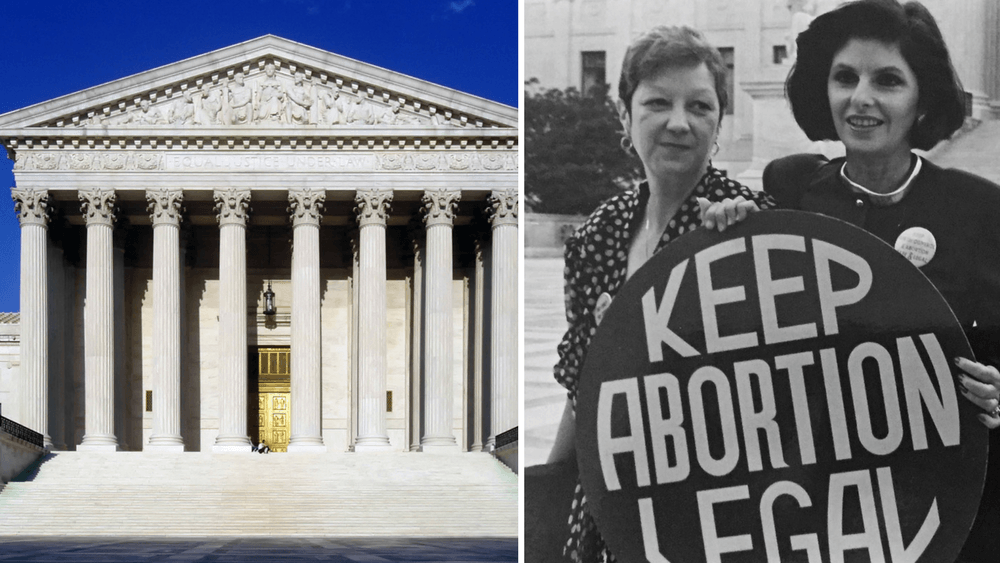Woman who helped make abortion legal in the US converts to Christianity, opposes abortion
“Jane Roe” of Roe v. Wade dedicated two decades to overturning legislation that bears her name
Norma McCorvey was the anonymous plaintiff “Jane Roe” in the infamous Roe v. Wade 1973 Supreme Court ruling that effectively legalised abortion across the United States. She died on Saturday 18 February in Texas, aged 69.
McCorvey was 22, unmarried, pregnant for the third time and seeking an abortion when she was introduced to two young Texan lawyers (Linda Coffee and Sarah Weddington). Under their guidance she brought a case against Henry Wade (the Dallas County District Attorney) to challenge the abortion legislation in Texas.
25 years after she signed an affidavit to instigate the court proceedings, McCorvey became a born-again Christian.
25 years after she signed an affidavit to instigate the court proceedings, McCorvey became a born-again Christian, and started working with pro-life groups to overturn Roe v. Wade.
In 1995, McCorvey was working at a Dallas women’s clinic when Christian anti-abortion group Operation Rescue moved in to the premises next door. McCorvey struck up an unlikely friendship with Rev. Phillip Benham, an evangelical minister and the then-director of Operation Rescue.
Within months, McCorvey accepted Jesus, and was baptised by Benham. Her conversion was heralded by anti-abortion activists, and she renounced her past and publicly committed to “serving the Lord and helping women save babies.”
Three years later, she had another spiritual conversion, this time to Roman Catholicism, after meeting Father Frank Pavone of the Catholic pro-life organisation Priests for Life. She remained Catholic until her death.
“I am dedicated to spending the rest of my life undoing the law that bears my name.” – Norma McCorvey
In 1998, on the eve of the 25th anniversary of the Supreme Court ruling, McCorvey testified before a U.S. Senate subcommittee, saying, “I am dedicated to spending the rest of my life undoing the law that bears my name. I would like nothing more than to have this law overturned, either by an act of Congress or a reversal in the Supreme Court.”
Troy Newman, director of Operation Rescue, who was banned from entering Australia in late 2015 after a change.org petition alleged he was a “vocal opponent of women’s safe, legal access to abortion,” told Eternity, “[McCorvey] epitomised the Christian life.
“She was walking away from God in her youth, [but then] she was doing everything in her power to right the wrongs that she helped perpetrate early in her life.”
Newman describes how McCorvey’s transformation really took place when she started working at an abortion clinic.
“She knew she was forgiven by God, but she still struggled with the weight of what was going on; I think she had a hard time forgiving herself.” – Troy Newman
“It went from the abstract to reality. She saw the limbs of the children, and it haunted her.”
When a young girl, Emily, invited McCorvey to church, Newman says, “church turned her life around.
“She knew she was forgiven by God, but she still struggled with the weight of what was going on; I think she had a hard time forgiving herself. She understood she was forgiven, she expressed that, and she went to church regularly.”
In her first book, I Am Roe: My Life, Roe V. Wade, and Freedom of Choice, McCorvey wrote, “I wasn’t the wrong person to become Jane Roe. I wasn’t the right person to become Jane Roe. I was just the person who became Jane Roe, of Roe v. Wade. And my life story, warts and all, was a little piece of history.”
McCorvey was lifted by chance into the national spotlight for a cause she never wanted to champion.
Born in Louisiana and raised in a broken home with an alcoholic and physically abusive mother, she was in trouble with the law from an early age and repeatedly raped by a relative in her young teens. She experimented sexually, and was bisexual, but primarily lesbian. At 16 she was pregnant with her first child.
McCorvey was the perfect plaintiff: poor, pregnant, and seeking an abortion.
She claimed that her mother tricked her into signing away custody of the baby, and then threw her out of the house.
Pregnant again a few years later, McCorvey gave the baby up for adoption, but when she fell pregnant a third time she decided to seek an abortion, but it was illegal in the majority of U.S. states, including Texas, where she lived.
Unable to afford the travel to one of the six states where abortion was legal, she told her doctor that she did not want to bring the pregnancy to term, but he still advised her to consult an adoption lawyer.
The adoption lawyer – Henry McCluskey – introduced McCorvey to Coffee and Weddington, who wanted to bring a legal case against the state’s anti-abortion statute. McCorvey was the perfect plaintiff: poor, pregnant, and seeking an abortion.
By all accounts, McCorvey had little or no idea what she was signing up for; she just wanted an abortion. By the time the lawsuit had been ruled on, McCorvey had given birth to the baby and given it up for adoption.
The decision of Roe v. Wade shaped the political and social landscape of the United States, and is still an exceedingly divisive issue.
(During his campaign for President, Donald Trump promised to appoint pro-life justices to the Supreme Court, saying this could mean the overturning of Roe v. Wade. He has already reinstated a global gag order on abortion, which requires non-governmental organisations, outside U.S. borders, that are receiving federal funding to agree to “neither perform nor actively promote abortion as a method of family planning in other nations”.)



